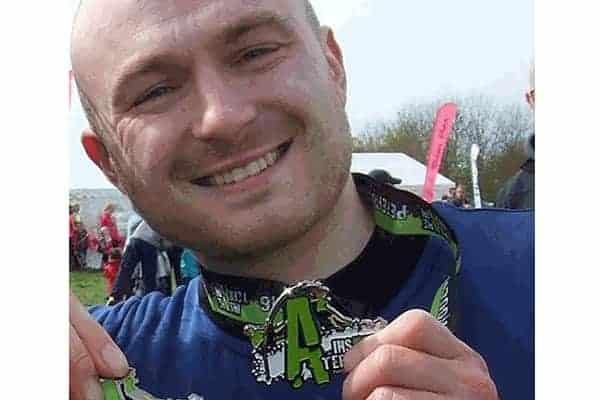
Starting a Personal Training business and becoming a BBC expert speaker with Simon Long
Posted on 9th December 2019 by Katherine Ducie
As part of our Meet The Freelancer series of blogs, we interview many freelance professionals from a range of industries.
Leicester based Personal Trainer and Behavioural Change expert, Simon Long, has been freelancing in the fitness industry for the past 15 years.
Personal training is well-known for being a highly competitive industry to break into. When you’re trying to sell in an over-saturated market it can be challenging. But despite its challenges, if you have something unique to offer, you’ll soon find your feet.
Providing a specialised service and defining what’s niche about your offering, will give you the power to excel and build a lucrative business. Over the past five years, Simon has done exactly that through honing his expertise in behavioural science.
Simon first found his interest in fitness while embarking on a weight loss journey at age 18.
After being diagnosed as clinically obese, he decided to turn his life around by focusing on his health. Over the course of just six months, Simon managed to lose 30 kilos and reduce his body fat from 36% to 6.5%. It was this personal achievement that spiked Simon’s love of fitness and consequently led to completing a personal training course.
Simon now works as a personal trainer at his business in Leicester, the Body Development Centre, and since 2007 has ran his own studio.
Balancing a business with higher education
Following ten years as a personal trainer, teaching client’s fitness best practice, Simon returned to his studies. A move that would eventually lunge his career forward.
Simon enrolled on an undergrad degree in Sports and Exercise Science at Loughborough university. At the end of this, he gained a 1st class degree and finished top of the year. It was during his studies that he began to learn about the impact psychology has on the longevity of exercise and nutrition plans. Fascinated by this subject, Simon decided to focus on the psychology element in his final year.
After completing his degree, Simon began a Master’s in Behaviour Change Psychology at University College London which he is soon to finish.
It’s this time spent in education and the expertise built around Behavioural Change that have made Simon’s approach to personal training distinctive.
Over the last five years of his studies, Simon maintained a personal training business. Doing this required working a 90-hour week. While that sounds gruelling on the surface, to Simon, it’s great.
Simon explains: “If you want to build a really successful business you have to dedicate that time at the beginning, and it is tough. Although I work 90 hours a week, I absolutely love working with my clients, reading the research and doing the studies around behaviour change. If you love it, it doesn’t feel like work.”
“I’ve never once woken up in the morning and thought oh no, I’ve got to get up and get started with this day. I’m always very happy to get up and get started because everything I do is based around what I love.”
Distinguishing yourself from the crowd
What Simon describes as being the catalyst for building a strong business in his local area is defining his unique selling point – Behavioural Science.
Simon tells us: “You can know everything about how to lose weight and how to exercise but if your head isn’t in the right place, you’re never going to apply any of it. That’s why in my third year of university, I focused more on the psychology of exercise and nutrition.”
“We could stop anybody on the street and ask, ‘how do you lose weight?’ They’ll say something along the lines of, ‘you move more and eat less’. Nearly everybody understands this, but the problem is actually mindset.”
The knowledge Simon has gained through his degree and masters has affected his approach to personal training and separated him from other personal trainers.
While Simon still works on training and nutrition, he most prominently works as a behavioural psychologist. This involves helping clients to understand why they struggle to exercise or eat well. He then works with the client to develop a plan that can overcome these obstacles.
This is achieved by assessing an individual’s mindset and working out how to motivate them, build habits and help them enjoy being healthy.
Becoming an expert speaker for the BBC
In recent years Simon has worked as an Expert Behaviour Science Speaker for his local BBC radio station. He has also shared his story on the TEDx stage and gained coverage in national press. He says these achievements are simply down to putting himself out there.
Keen to provide an expert voice, Simon approached the BBC on several occasions with a story pitch.
Simon explains: “I kept approaching them saying look I’ve got this interesting story, whatever it happened to be.”
“It might be that a celebrity has lost a lot of weight or there’s a new story come out about different ways to approach weight loss. I’d say look this story has come out, it’s on topic and I’ve got an interesting viewpoint to give. And so I went along to a couple of these radio talks and before long they started inviting me back. They’d ring and say we’ve got these topics we thought you might have some interesting viewpoints around.”
The way Simon managed to get through to someone at the BBC was by first doing some online research and searching for names of individuals who were responsible for editing the radio content and began to email story ideas over to these people.
Simon says: “The first one I sent; I didn’t get a reply. The second one I sent, he said it wasn’t anything of interest to himself but the third one he said, ‘ok, yes, let’s get you in’ and it went from there.”
Becoming a TEDx speaker
Having long been a fan of TED Talks, Simon decided that he’d like to do a talk himself and share the knowledge he holds around Behavioural Science.
To bring his idea into fruition, Simon went around all of the different TEDx events and proposed his idea. The majority of the feedback he received was that he didn’t have enough public speaking experience to do a TED Talk.
With this, Simon contacted a range of events where you can go along and talk in front of the group about anything that interests you. After attending a couple of these and getting them recorded, he went back to TED and sent the recordings in. That gave Simon the experience he needed to get the green light and present his very own TEDx Talk.
Being a TED speaker, BBC speaker and featured in press, both national and local, has provided excellent credibility and took Simon’s business to a new level.
Acquiring new clients
To win new clients, Simon brings a fighting spirit to his marketing, using the good old method of jab, jab hook. This involves utilising every possible advertising avenue, in order to gain a win and determine which techniques works the best for you.
Using social media platforms including YouTube, Facebook and Instagram, Simon recommends putting out lots of free information, such as fitness tips, to get people to buy into you and see your value.
He says: “You could put out five bits of information that are free and the sixth piece of information will be something like, ‘Come train with me. Sign up in November and get 20% off a personal training package.’ Because people have already bought into you, with the other information you provide, now they become more likely to purchase a personal training plan or whatever your service happens to be.”
Simon finds content marketing and public relations work most efficiently in bringing in new business.
Simon’s advice to anyone starting up a new business:
- Don’t take rejection personally. Eventually it will become water off a duck’s back. If you’re going to put yourself out there, the majority of the time people are going to ignore you, but you will get some wins.
- Be persistent and don’t give up at the first hurdle. It can take six or seven different touchpoints with someone before you get an opportunity.
- Make sure you have enough money to cover your overheads before you start your own business.
- While it’s easy to ignore an email, it’s hard to ignore someone who is on the phone. Talking to people helps build trust quicker and is a better way to convey your personality and your passion for your profession.
Simon’s advice on establishing yourself as a Personal Trainer:
- After gaining your personal training qualification, spend some time working in a gym to build up your following and learn from the other experienced trainers around you, before you open your own facilities.
- Define your speciality, for example body building training or marathon training as every personal trainer is going to work more generally on nutrition and training.
- If you know your speciality, that will help you to target your marketing and really pull out dedicated clientele who believe in what you do.
Simon protects his business with Professional Indemnity insurance and Public Liability insurance.
For more information on how you can stay protected with freelance insurance, call our friendly team of experts today on 0333 321 1403, or click to get a quick online quote in minutes!
CLICK HERE FOR A QUICK ONLINE BUSINESS INSURANCE QUOTE
Related Articles:
How to keep your personal training business going through COVID-19
Steps to ensure the success of your personal training business
Useful Links

Professional Indemnity Insurance
Protects against claims of alleged negligence in your professional services, advice and designs.

Public Liability Insurance
Protects against claims of injury to third-parties or damage to a third-party's property.

Cyber Insurance
Covers your business in the event of a malicious attack on your computer systems and data.
